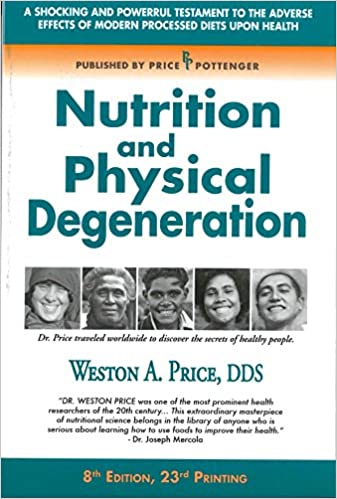“Nutrition and Physical Degeneration” is a book by Dr. Weston Price published in 1939. Weston Price was a dentist who spent 10 years in the 1930s researching the relationship between diet and physical health in different populations around the world. He found that indigenous people who followed traditional diets had remarkable physical health despite limited access to modern medical care. In this blog post, we will explore the top 10 lessons from “Nutrition and Physical Degeneration” and their relevance to modern society.
Lesson 1: Traditional Diets Promote Optimal Health
Weston Price found that indigenous populations who followed traditional diets had excellent physical health, free from the diseases that plague modern societies. Traditional diets consisted of natural, unprocessed foods that were nutrient-dense and provided sufficient fat-soluble vitamins. These diets were high in animal products, including organ meats and fish, and were low in processed foods, sugar, and refined grains.
Lesson 2: The Lack of Nutrient-Dense Foods Causes Physical Degeneration
The modern, industrialized diet lacks many of the essential nutrients found in traditional diets. Processed foods, refined grains, sugar, and vegetable oils are all nutrient-poor and contribute to physical degeneration. Nutrient deficiencies resulting from a lack of nutrient-dense foods can lead to various health problems, including tooth decay, malocclusion, and chronic diseases.
Lesson 3: The Importance of Fat-Soluble Vitamins
Weston Price discovered the critical role that fat-soluble vitamins play in maintaining optimal health. These vitamins, which are found in animal fats, are important for the absorption of minerals and for maintaining healthy teeth, gums, and bones. The traditional diets that he studied were high in these vitamins, especially vitamins A, D, and K2.
Lesson 4: The Relationship Between Nutrition and Physical Appearance
One of the most striking findings in Weston Price’s research was the relationship between diet and physical appearance. He found that populations who followed traditional diets had excellent dental health and robust physical features, in contrast to populations who followed modern diets and had poor dental health and delicate, underdeveloped facial structures.
Lesson 5: The Role of Fermented Foods in Traditional Diets
Weston Price found that fermented foods were an essential part of traditional diets. Fermentation increases the digestibility and nutrient content of food and plays a critical role in maintaining gut health. Fermented foods include sauerkraut, kimchi, kefir, and yogurt, among others.
Lesson 6: The Dangers of Refined Grains
Refined grains, such as white flour, lack essential nutrients found in whole grains. Weston Price found that populations who replaced traditional whole grains with refined grains experienced physical degeneration, including tooth decay and skeletal deformities. He recommended that people consume whole grains in their natural, unprocessed form to maintain optimal health.
Lesson 7: The Relationship Between Physical and Mental Health
Weston Price found that physical and mental health are closely linked. Poor physical health resulting from nutrient deficiencies can lead to mental health problems, including depression and anxiety. Following a traditional, nutrient-dense diet can help prevent mental health problems and promote overall well-being.
Lesson 8: The Importance of Local Foods and Agriculture
Weston Price found that traditional diets were closely tied to local agriculture and food production. Eating locally grown fruits, vegetables, and animal products ensures that individuals have access to nutrient-dense foods that are fresh and in-season. Supporting local food systems and sustainable agriculture is critical for promoting optimal health.
Lesson 9: Raising Healthy Children Requires Proper Nutrition During Pregnancy and Lactation
Weston Price found that proper nutrition during pregnancy and lactation is essential for raising healthy children. Nutrient deficiencies during these stages can lead to physical deformities and chronic diseases in children. Following a nutrient-dense diet during pregnancy and lactation can help ensure that children are born healthy and have the best chance for optimal physical and mental development.
Lesson 10: Traditional Diets Promote Optimal Health Across Generations
Following a nutrient-dense, traditional diet can promote optimal health not only for individuals but also across generations. Weston Price found that populations who followed traditional diets for generations had excellent physical and dental health, while those who adopted modern diets experienced physical degeneration over time. By following traditional diets, individuals can promote long-term health and well-being for themselves and future generations.
Conclusion
“Nutrition and Physical Degeneration” offers valuable insights into the relationship between diet and physical health. By following the lessons outlined in this book, individuals can incorporate nutrient-dense, traditional foods into their diets, promoting optimal health and preventing physical and mental degeneration. Following a nutrient-dense diet is critical for maintaining long-term health and well-being for individuals and future generations.

Nutrition and Physical Degeneration
Weston A. Price



